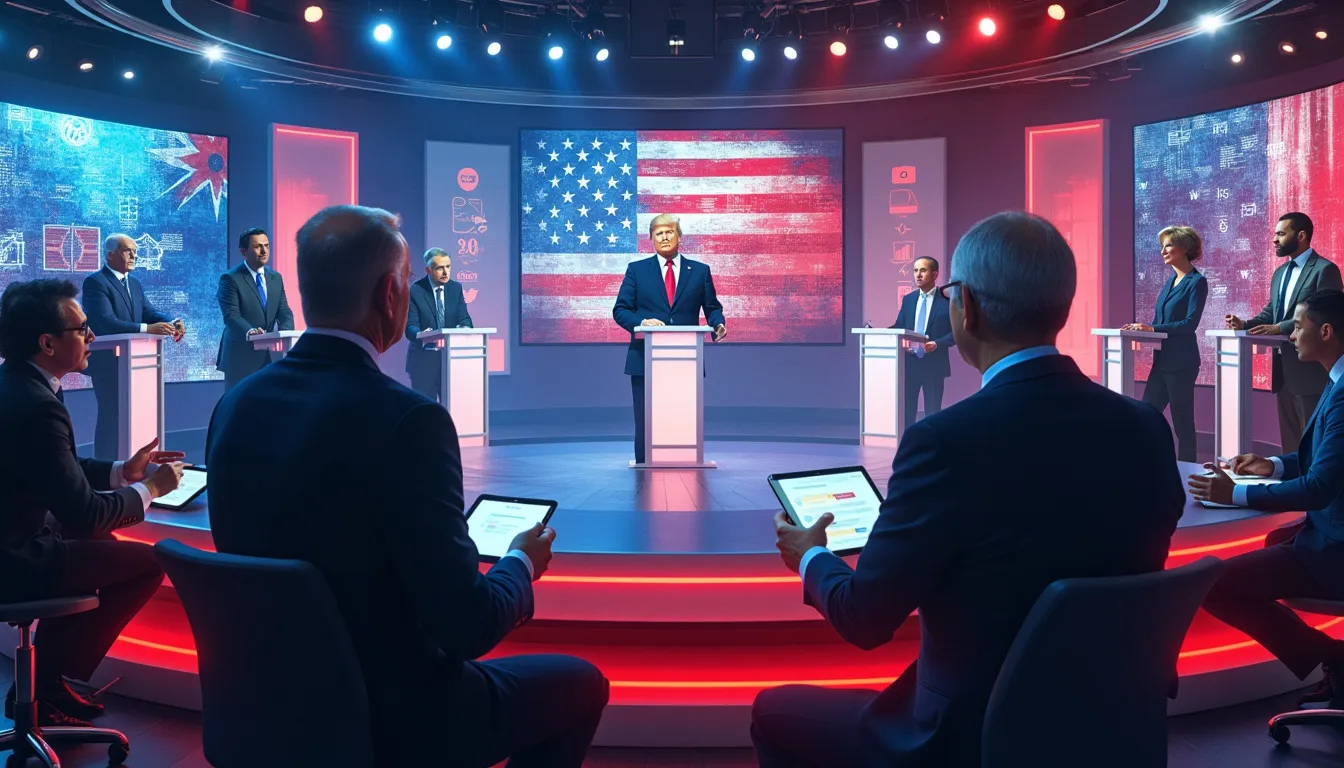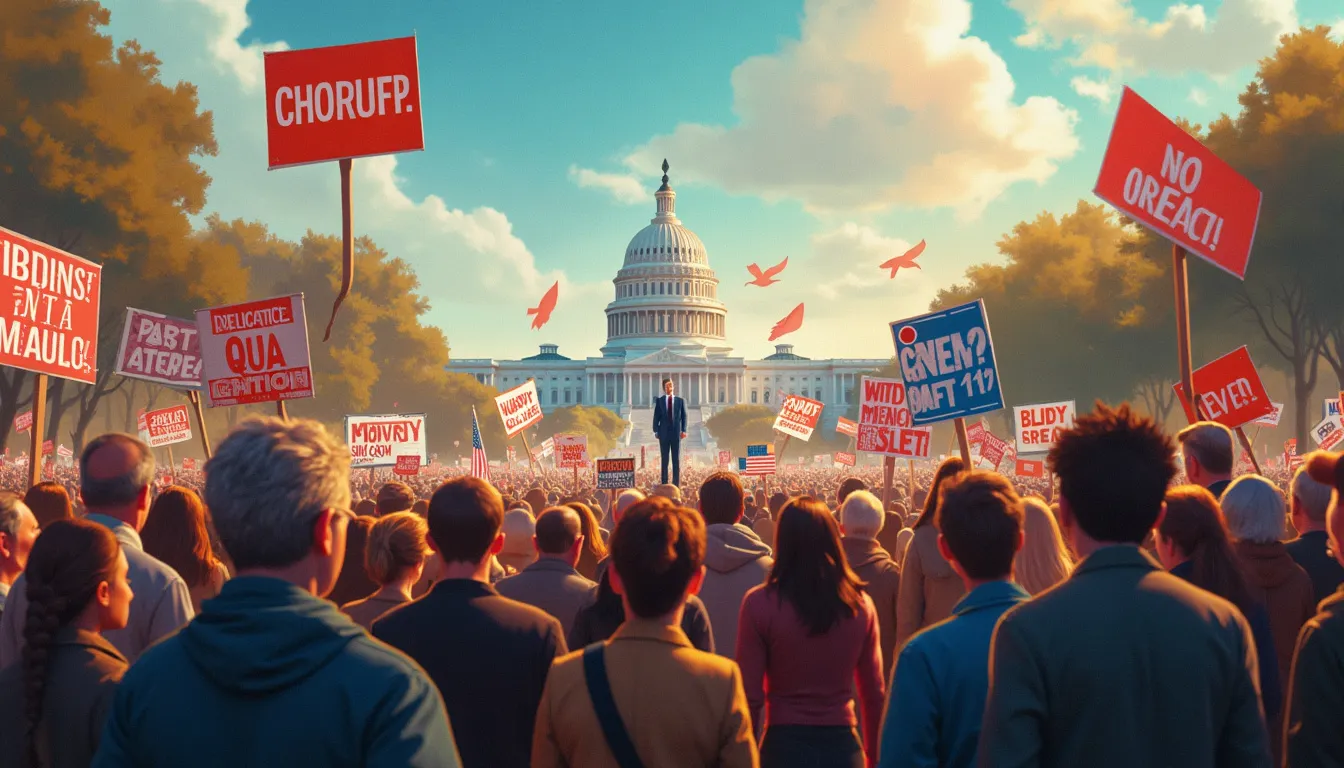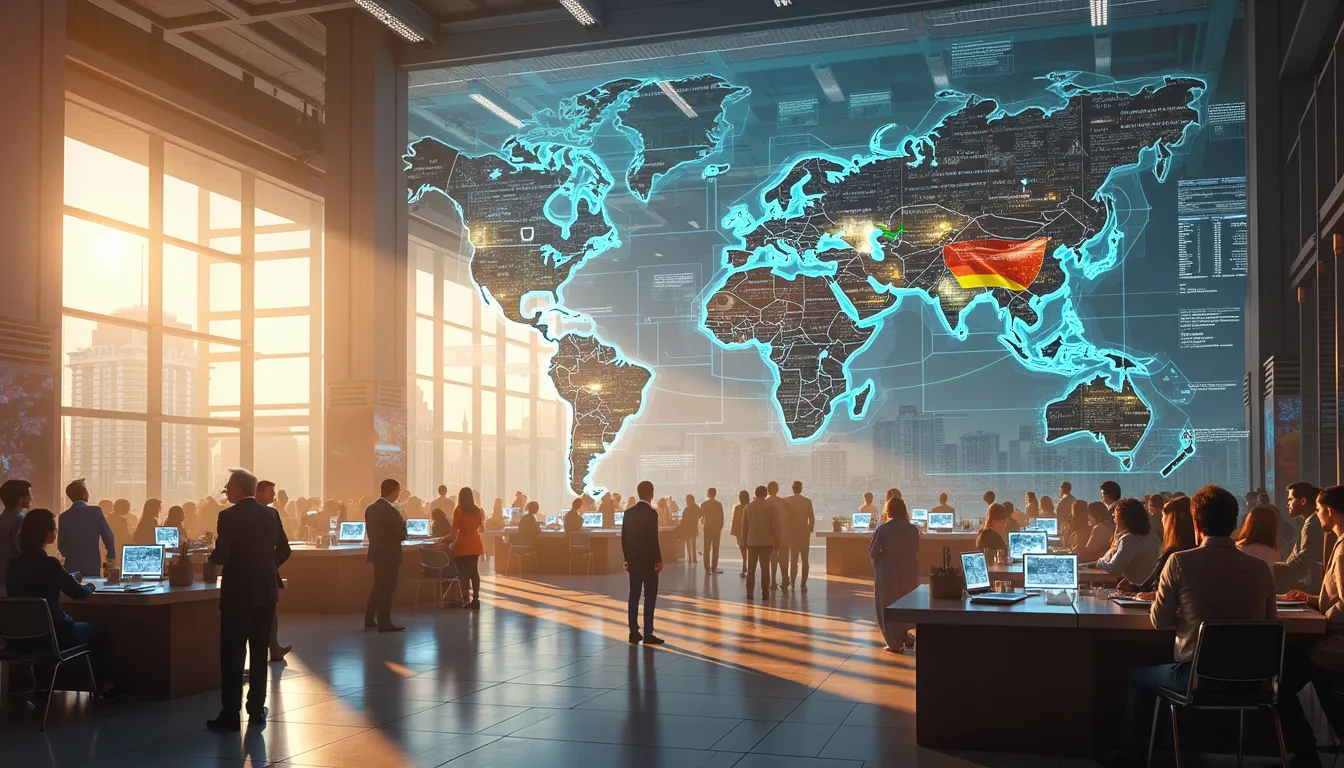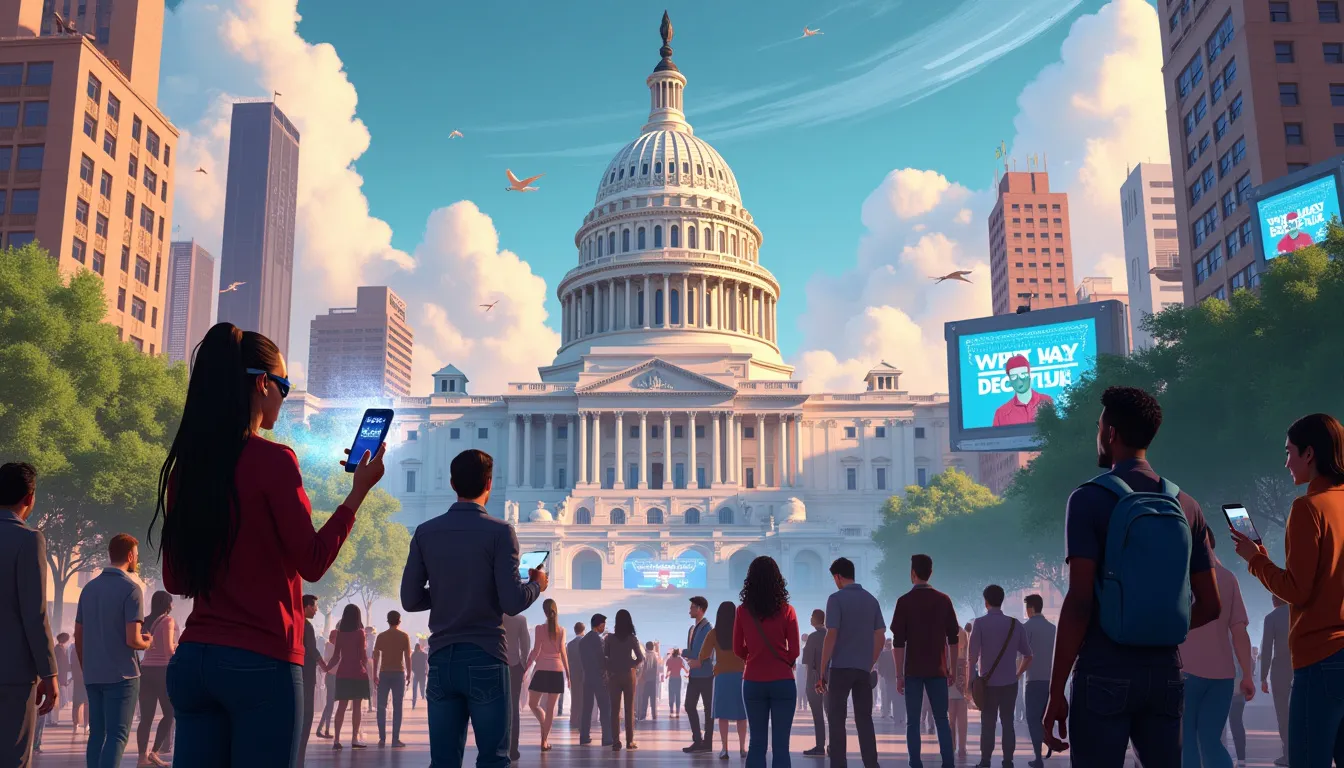Politics, often referred to as the art of the possible, is undergoing a transformation akin to a caterpillar morphing into a butterfly. Yet, this metamorphosis is far from seamless and predictable. Modern politics is an intricate tapestry woven from threads of technology, globalization, and evolving societal norms. It’s like standing at a bustling intersection where history, culture, and innovation converge, influencing not just laws and policies, but the very fabric of our daily lives.
Imagine the political landscape as a dynamic and ever-shifting sand dune. One gust of wind – a viral tweet, a groundbreaking policy, or a significant demographic change – can reshape the terrain in an instant. Today, grasping the changing currents of politics demands more than a passive glance; it requires a keen eye and an engaged mind. We find ourselves at a juncture where understanding these shifts isn’t merely academic; it’s imperative for informed citizenship and effective participation.
Take, for instance, the omnipresence of digital media. Just a few decades ago, politics was a domain dominated by a select few voices in print and broadcast media. Now, social media platforms like Twitter and Facebook have democratized political discourse, making it possible for anyone with a smartphone to voice their opinions, rally support, or even start a movement. The screen in our hands has become a new battleground where political ideas and candidates vie for attention in real-time.
Globalization, too, has woven a complex web of interconnected policies and relationships. Decisions made in one corner of the world can reverberate globally, impacting trade, climate agreements, and international relations. Consider the way Brexit shook not just the United Kingdom but had ripple effects felt in economies and political alliances far beyond its shores.
Additionally, demographic shifts are reshaping political priorities. From young voters demanding sustainable environmental policies to aging populations requiring more comprehensive healthcare solutions, the changing makeup of our societies is rewriting political agendas. It’s like an orchestra where new instruments are constantly being added, creating a symphony that requires deft navigation and adaptation.
In this whirlwind of change, traditional political structures are being challenged. Populist movements have disrupted established norms, while new political parties and grassroots movements have sprung up, giving voice to previously marginalized groups. Voters are no longer passive spectators; they are active participants, using their ballots to signal their demand for change.
As we cast our eyes to the future, the landscape only promises to evolve further. Political strategies will likely leverage artificial intelligence and data analytics, making campaigns more targeted and efficient. However, this also brings new challenges, from concerns over data privacy to the ethical implications of AI in decision-making.
In navigating this complex political terrain, we are all explorers in uncharted territory. By staying informed and engaged, we can better comprehend the changes swirling around us and take actionable steps to shape the future. Whether it’s through voting, activism, or simply staying informed, we all have a role to play in steering the ship of modern politics through these unpredictable waters.
Introduction to Modern Politics
Politics, the art and science of governance, has always been a dynamic field, shaped by the ever-changing currents of society. When we talk about modern politics, we are diving into a vast, intricate web that spans local municipalities to international coalitions, influencing everything from the price of bread at your local store to the terms of global trade agreements.
Modern politics isn’t just a string of names and dates; it’s a rich tapestry woven with the threads of current events, ideologies, and the profound technological leaps that define our age. In the digital age, politics has metamorphosed, morphing to accommodate rapid information flow, social media’s pervasive reach, and a globalized world where decisions ripple outwards across continents.
Understanding the changes in modern politics is like having a map in a dense forest. Without it, we might find ourselves lost, wandering among the murky trees of misinformation, manipulation, and misunderstanding. Grasping the changes in contemporary political landscapes equips us with the knowledge to navigate, influence, and perhaps even lead within this continuously evolving arena.
Definition and Scope of Modern Politics
The term modern politics can be somewhat elusive, as it encompasses a broad range of activities, ideologies, and institutions. At its core, modern politics involves the processes by which groups of people make collective decisions. This can manifest in various ways, from the halls of parliaments to the informal debates in community gatherings and even the discourse proliferating on digital platforms.
In essence, politics today extends beyond mere governance. It’s about power dynamics, social justice, environmental stewardship, economic management, and cultural integration. It’s the interplay of these numerous components that creates the rich mosaic of modern politics.
Brief Overview of the Contemporary Political Landscape
Shifting our lens to the contemporary political landscape, we notice a world in flux. Gone are the days when political engagement meant merely casting a vote every few years. The 21st century has seen a surge in political activism, driven in large part by technological advancements. Social media platforms act as both battlegrounds and stages for political discourse. They offer a voice to the marginalized, while equally amplifying the loudest and often most controversial opinions.
Internationally, politics has become more interconnected than ever before, with policies in one nation echoing in others. Economic crises, climate change, migration, and terrorism are some of the global issues that require collaborative political solutions. Domestically, nations are facing their own unique challenges and transformations. For instance, the rise of populism has disrupted established political norms in many democracies, redefining what it means to be a leader and who is considered an outsider.
Importance of Understanding the Changes in Politics
Imagine trying to sail across an ocean without an understanding of the stars, winds, or currents. That’s the predicament we’d be in if we ignored the shifts in modern politics. Comprehending these changes enables us to make informed decisions, advocate for meaningful policies, and engage in constructive debates.
Take, for instance, the phenomenon of ‘fake news’. By recognizing how misinformation spreads and its impact on elections and public opinion, we can better fortify ourselves against its detrimental effects. On the other hand, understanding the mechanisms and benefits of grassroots movements allows us to harness collective power to drive societal change.
Furthermore, an awareness of political changes is crucial for anyone looking to enter the political arena. Whether you’re a budding politician, a policy advisor, or even a concerned citizen, knowing the lay of the land equips you with the tools to navigate it effectively.
The fluctuations in modern politics affect every facet of our lives, from the taxes we pay to the liberties we enjoy. As we proceed to explore the factors shaping these political shifts, it becomes clear that we’re not merely passive observers but active participants in this grand narrative. So, let’s embrace this journey with curiosity and a keen eye, as the winds of change continue to shape the political landscape we inhabit.

Key Factors Influencing Modern Politics
Technological Advancements and Digital Media’s Role in Politics
The advent of technology has turned the political world upside down like never before. Imagine the political arena as an intricate dance, once performed on an exclusive stage visible to only a select audience. Now, thanks to the explosion of digital media, this performance has spilled into the vast, unpredictable world of social networking, where everyone has a backstage pass. Politicians can now connect with constituents with just a few keystrokes, while social media platforms like Twitter and Facebook serve as the modern-day public squares, teeming with debates, discussions, and sometimes, divisive diatribes.
Consider the 2008 and 2012 U.S. presidential campaigns. Barack Obama’s strategic use of social media not only catalyzed his victories but also set a precedent for future campaigns. Twitter hashtags and Facebook posts became as important as traditional rallies and TV advertisements. Suddenly, voters could directly express their views, engage in debates, and rally support for their favored candidates without ever leaving their living rooms.
This new landscape not only democratized political engagement but also introduced challenges. False information can spread like wildfire, with fake news often misleading or polarizing the electorate. On the flip side, digital activism has empowered movements such as the Arab Spring and Black Lives Matter, proving that technology, when wielded wisely, can drive substantial political change.
The Impact of Globalization on Political Policies and Relations
Picture the world as a giant cobweb, where every thread is connected to another. Pull on one strand, and the entire structure reverberates. This is the essence of globalization, a force that has seamlessly woven together the economies, cultures, and politics of different nations. Globalization has transformed the political landscape into a complex web of interdependencies, where policies in one nation can have rippling effects across the globe.
Take, for instance, trade policies. Free trade agreements like NAFTA have led to increased economic collaboration and competitiveness, but they have also sparked debates about job outsourcing and national sovereignty. When one country’s economy suffers, like during the 2008 financial crisis, the tremors are felt worldwide. Governments must now consider not just the domestic implications of their policies but also their international repercussions.
Environmental policies also highlight the impact of globalization. Climate change is a global issue that no single nation can tackle alone. Political leaders must collaborate across borders, as seen with the Paris Agreement, to address environmental concerns. This interconnectedness shapes modern political priorities, pushing politicians to think beyond their borders and work towards collective global solutions.
Demographic Shifts and Their Influence on Political Priorities
Imagine a vast landscape that continuously evolves with waves of migration, aging populations, and shifts in cultural norms. These demographic changes act like the ebb and flow of tides, constantly reshaping the political terrain. As the world’s demographic structure transforms, so do the priorities and strategies of politicians aiming to serve their changing constituencies.
Consider the aging population in many Western countries. As the baby boomer generation retires, issues like social security, healthcare, and pensions take center stage. Politicians are compelled to address the concerns of seniors, a powerful and active voter bloc, by crafting policies that ensure their well-being. Conversely, younger generations, increasingly diverse and tech-savvy, demand action on climate change, education reform, and social justice. The political focus shifts to balance these sometimes competing priorities.
Migration patterns also significantly influence politics. Imagine neighborhoods teeming with rich cultural diversity as immigrants bring their traditions, languages, and perspectives. Policymakers must navigate these waters carefully, balancing the needs of both native citizens and newcomers. Immigration policies become hot topics, often polarizing the electorate and defining political platforms. In the U.S., debates over border security and DACA (Deferred Action for Childhood Arrivals) are vivid examples of how demographic shifts influence political discourse.
Moreover, the rise of urbanization has led to a concentration of population in cities, redefining political landscapes. Urban areas, often liberal and progressive, clash with the more conservative rural regions, creating a tapestry of political ideologies that politicians need to address to build cohesive and inclusive strategies.
As the dynamic rhythm of technology’s advancements, globalization’s reach, and demographic shifts harmonize, modern politics transforms continuously. Politicians, therefore, need to be adaptable and receptive, much like seasoned sailors navigating through an ever-changing sea. In this grand theater of politics, the actors must continuously evolve, engage and empathize with their audience to keep the pulse of democracy alive and flourishing.

Significant Changes in Political Dynamics
The Rise of Populism and Its Effects on Traditional Politics
In the ever-evolving world of politics, one of the most notable shifts has been the surge of populism. Imagine politics as a grand old oak tree. For years, it has stood strong with its deep roots and sprawling branches symbolizing long-established traditions and ideologies. However, populism is like a fierce storm that has swept through, shaking the very foundation of this venerable tree. Populist leaders, with their promises of returning power to the ‘common people’ and addressing their grievances, have upended conventional politics, creating ripples that are felt globally.
Take the example of the United States with the rise of leaders like Donald Trump. His 2016 campaign was built on a quintessentially populist narrative – draining the swamp, putting America first, and giving voice to what he called the ‘silent majority.’ This approach dismantled the conventional Republican framework, creating a faction that wasn’t afraid to blur the lines of traditional political decorum. Similarly, across the ocean in Europe, Brexit was led by populist ideals, with leaders like Nigel Farage tapping into nationalistic sentiments and dissatisfaction with the European Union.
The Emergence of New Political Parties and Movements
Amid the tempest of populism, fresh saplings in the form of new political parties and movements have sprung up, challenging the entrenched two-party systems prevalent in many democracies. These new entities often rise from the void left by traditional parties that fail to address contemporary issues that resonate deeply with the populace.
For instance, in France, the movement La République En Marche! led by Emmanuel Macron disrupted the long-standing dichotomy between Socialists and Republicans. Macron’s centrism and progressive policies appealed to a wide range of voters disillusioned by the traditional political landscape. Similarly, Spain’s Podemos emerged from the 2011-12 anti-austerity protests, channeling the frustrations of a generation grappling with economic instability and lack of opportunities.
These new movements are not just symptoms of political dissatisfaction; they are manifestations of a broader transformation. They often leverage modern communication tools and grassroots campaigning, sidestepping the expensive and often insular methods employed by traditional parties. These movements restore faith in political engagement for many, breathing new life into the democratic process.
Changes in Voter Behavior and Engagement
Perhaps nothing illustrates the shifting sands of political dynamics more poignantly than the evolution of voter behavior and engagement. Picture the citizen as a seasoned sailor, navigating the vast ocean of political discourse. In the past, their journeys were guided by trusted maps – stable party ideologies and predictable platforms. Nowadays, the sailor must be more adept, as waters have become unpredictable with currents driven by social media, 24-hour news cycles, and novel political agendas.
The traditional loyalty to political parties has waned, with voters showing increased fluidity in their affiliations. This change is particularly palpable among younger generations, who often prioritize issues over party loyalty. Whether it’s climate change, social justice, or economic inequality, Millennials and Gen Z are less likely to vote along strict party lines and more likely to support candidates and parties that align with their core values.
Take, for example, the 2019 climate strikes led by Greta Thunberg, which mobilized millions worldwide. This global event showcased the burgeoning influence of social movements on youth political engagement. Voters were inspired to support candidates who placed environmental sustainability at the forefront of their platform.
Moreover, the internet and social media platforms have revolutionized how voters engage with politics. The barriers to accessing information and participating in discourse have lowered dramatically. During elections, voters are no longer passive recipients of campaign information; they are active participants, using social media to organize, debate, and advocate. The virality of hashtags and digital activism, such as the #MeToo movement, has proven that virtual spaces can exert tremendous real-world influence, rendering the traditional modes of campaigning nearly obsolete.
However, this digital shift isn’t without its pitfalls. The proliferation of fake news and disinformation campaigns can sway elections and undermine democratic processes. As consumers of information, voters must develop a critical eye and seek out credible sources, much like a sailor who must differentiate between reliable lighthouses and deceptive ghost lights.
Conclusion: Embracing Change and Driving Engagement
The landscape of modern politics is undeniably in flux, with populism disrupting established norms, new political movements challenging traditional power structures, and voter behavior becoming increasingly dynamic. These significant changes require a reevaluation of how we engage with politics, emphasizing the importance of staying informed and involved. By understanding and adapting to these shifts, both politicians and voters can navigate the evolving political terrain more effectively, shaping a future that reflects the diverse and ever-changing aspirations of the populace.

Future Trends in Politics
The ever-shifting sands of politics are not unlike the unpredictable dance of the tides, constantly molded by currents of change. As we cast our gaze toward the horizon, several compelling trends are beginning to take shape, poised to redefine the political landscape in unprecedented ways.
Predictions on the Evolution of Political Strategies and Platforms
The future of politics is on the brink of a revolution, akin to the transformation of caterpillars into butterflies. Traditional methods of garnering support, such as door-to-door campaigning and televised debates, are no longer reigning supreme. Instead, we are witnessing a seismic shift towards digital narratives where social media platforms like Twitter, Instagram, and TikTok are becoming battlegrounds for political ideologies.
Imagine candidates employing memes and viral videos to connect with a younger, tech-savvy electorate. These digital strategies are not just about being trendy; they provide a democratic space where voices can rise above the noise, allowing even unconventional candidates to gain traction. Take, for instance, Alexandria Ocasio-Cortez’s imaginative use of Instagram Live to host informal “chats” about policy issues. It’s a strategy that feels less like a lecture and more like a heart-to-heart conversation, resonating deeply with a generation that values authenticity.
In addition to digital savvy, future political platforms are anticipated to be more inclusive and diverse, reflecting the mosaic of global societies. Issues like climate change, data privacy, and mental health are set to take center stage, replacing older, more rigid agendas. As politicians delve into these realms, they must be prepared to offer comprehensive, multifaceted solutions that appeal to an electorate increasingly concerned with not just the “what” but the “how” of policymaking.
The Potential Role of Artificial Intelligence and Data Analytics in Politics
If political strategy were a chess game, then artificial intelligence (AI) is the grandmaster poised to change the very tenets of play. AI and data analytics are the crystal balls of the future, providing insights that can shape everything from campaign strategies to policy decisions.
Picture a world where algorithms predict voter behavior with uncanny accuracy. The 2012 Obama campaign already saw the nascent use of data analytics to target voters and tailor messages that resonated on a personal level. Going forward, the relationship between politicians and AI is expected to deepen, with data becoming both map and compass in the political journey.
However, the use of AI brings its own set of ethical questions to the table. How do we balance the precision of AI with the unpredictability of human behavior? What safeguards will be necessary to prevent manipulation or invasion of privacy? As we grapple with these questions, it’s crucial to remember that while AI can analyze patterns, it’s the human touch—a leader’s empathy, conviction, and vision—that truly sways the electorate.
Anticipated Challenges and Opportunities in the Political Arena
As politics evolve, so do the challenges and opportunities that define the arena. One anticipatory challenge is the growing divide between political ideologies, amplified by echo chambers on social media and partisan news outlets. Bridging this chasm requires politicians to become not just leaders, but unifiers who can foster dialogue and understanding across divides.
Another looming hurdle is the threat of disinformation and cyber threats. With hackers and state actors capable of skewing electoral outcomes, ensuring the integrity of elections is paramount. The fight against fake news and cyber-attacks will likely involve a combination of robust cybersecurity measures, legislative action, and digital literacy programs aimed at educating the public on identifying misinformation.
Conversely, there are immense opportunities awaiting those who dare to innovate. The increasing importance of grassroots movements exemplifies a return to the very roots of democracy. Platforms like crowdfunding have already revolutionized how campaigns are financed, enabling candidates to rely less on corporate donations and more on “the people’s currency.” This democratization of funding could lead to a surge in diverse candidates who better represent the populace.
Furthermore, global issues require global cooperation. Politicians of the future have the opportunity to build alliances that transcend borders, fostering international cooperation on pressing issues like climate change, migration, and public health. The lessons of the COVID-19 pandemic underscore the necessity for such unity, highlighting that in an interconnected world, isolationism is not a viable strategy.
In conclusion, the future of politics holds a promise as vibrant and complex as a kaleidoscope. As we navigate the ebbs and flows of change, it’s essential to remain engaged and informed. By understanding and anticipating the trends poised to shape politics, we empower ourselves to be not just spectators, but active participants in the grand narrative of democracy.
As we navigate through the ever-evolving world of modern politics, it’s clear that the landscape is not just shifting but transforming in profound and unpredictable ways. Each wave of technological advancement, every ripple of globalization, and every shift in demographics sends currents through the political sea, shaping the future in ways both subtle and striking.
Consider the profound impact of digital media, which has not only redefined how political messages are disseminated but also expanded the platform for civic engagement, enabling near-instantaneous global conversations. While this democratization of voices is a powerful force, it also complicates the political discourse, introducing challenges like misinformation and echo chambers. As we embrace the benefits of technology, we must also be vigilant about its pitfalls.
Globalization has further intertwined our world, creating political policies that reach across borders and challenge traditional notions of sovereignty. The interconnectedness of economies, cultures, and environmental concerns necessitates a more collaborative approach to governance, where the actions of one nation reverberate globally. This spider’s web of international relations demands political leaders to be not just national figures but global strategists.
Meanwhile, demographic shifts reshape the political tapestry with new threads, bringing diverse needs and perspectives to the forefront. As younger generations step into their political power and increasingly diverse populations assert their voices, political priorities are being rearranged. The call for social justice, climate action, and economic equality reverberates louder than ever before, pushing political parties to reevaluate their platforms.
Amid these dynamic forces, the rise of populism serves as a reminder of the discontent and desire for change that pervades traditional political structures. Populist movements, while often polarizing, underscore a critical need for the political establishment to reconnect with the electorate. This period of upheaval has paved the way for new political parties and movements to emerge, offering fresh ideas and challenging the status quo.
Looking forward, the future of politics promises an intricate dance between maintaining stability and embracing innovation. Artificial intelligence and data analytics will likely play pivotal roles, refining political strategies and enhancing the understanding of electorate behaviors. With these tools, politicians can craft messages with surgical precision, though the ethical implications will need careful consideration.
The road ahead is lined with challenges—finding balance in a hyper-connected world, safeguarding democratic processes in the digital age, and ensuring that all voices are heard in the political discourse. But these challenges are also opportunities for growth and innovation. They beckon us to be active participants in the political process, to engage with our communities, and to advocate for the changes we wish to see.
In this ever-changing political landscape, we must remain informed, adaptable, and optimistic. By understanding the forces at play and actively contributing to the dialogue, we can help shape a future that reflects our collective values and aspirations. Whether it’s through voting, community involvement, or simply staying informed, our engagement is the anchor that will steady the ship in these tumultuous waters of modern politics.
